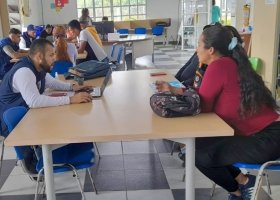|
Since 2015, Venezuelan refugees and migrants have been displaced in large numbers across Latin America. According to the United Nations High Commissioner for Refugees (UNHCR) and International Organization for Migration (IOM), more than 6 million Venezuelans are living abroad, of which over 4.9 million are hosted in Latin American and Caribbean countries. With the increasing numbers of displaced people around the world, the need for more sustainable and efficient solutions to support both displaced people and host communities has never been greater.
In 2021, the Colombian government provided ten-year Temporary Protected Status (TPS) to most of the 1.8 million Venezuelan refugees and migrants in the country, thereby creating an enabling environment for their integration. Recognizing that regularization is key to long-term solutions, including access to job market, Ecuador also plans to introduce an initiative that would put the over 500,000 Venezuelans it hosts on the path toward socioeconomic inclusion. Because forced migration is both a humanitarian and development issue, tackling its challenges requires the collective efforts of government, development, humanitarian and private sector partners.
On Tuesday, June 7, 2022, from 1:30 pm to 4:00 pm PT the Refugee and Forced Displacement Initiative (RAFDI) and Latin American Program (LAP) of the Woodrow Wilson International Center for Scholars, in partnership with the Conrad N. Hilton Foundation and Migration Policy Institute (MPI), will hold a public event on the margins of the Summit of the Americas in Los Angeles. The event, “A Path to Self-Sufficiency: Advancing Venezuelan Refugee Integration in the Americas,” will focus on the critical need for successful integration of Venezuelans in Colombia, Ecuador, and the rest of the region. The discussion will address some of the ongoing implementation challenges, barriers that limit integration, and the critical roles that the public and private sectors can play in delivering solutions and ensuring the success of these bold government initiatives. Speakers will emphasize opportunities and challenges for refugee employment and entrepreneurship, both vital paths to economic self-sufficiency.
|
































